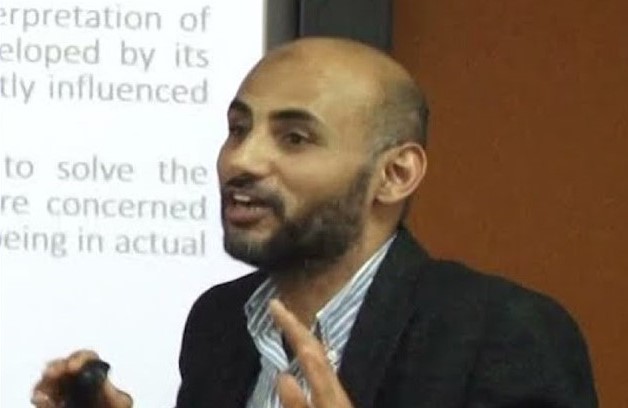This language is currently in review and will be available soon!

When it comes to women’s issues in today’s world, the religious text seems to pose an important challenge: how the reader may resolve tensions between what the text seems to say and what it might mean in connection to a changing reality. This tension between text and meaning defines the hermeneutical (interpretative) problem that modern hermeneuticians have sought to resolve by anchoring the meaning of the text into one’s understanding of it. I propose that such tensions between text and meaning can be relaxed and be better understood when the text is read in connection with the concrete situation that the text is called to address. This interpretative process within theological studies can bring together textual interpretation and empirical investigation in a mutually fruitful conversation, hence bridging the gap between doctrine (or textual interpretation) and praxis.
In an interview with an imam about the interpretation of Qur’ān 4:34, which some take to justify wife hitting in the name of Islam, the imam explained:
There are two elements to understanding or to give a ruling [regarding a scriptural text]: first is understanding the verse or the ḥadīth of Prophet Muḥammad (PBUH) as intended by the lawgiver, and then secondly it comes to how we apply this in the most appropriate way. I wouldn’t say the practicality of the situation will change how you interpret the verse, but I would say that the practicality of the situation will change how you apply, or whether you apply in the first place, or whether you apply it for the moment. Coming to the matter of interpretation is one thing and how we apply that is another discussion.
This differentiation between interpretation and application has been understood in Anglophone theological studies as a theological interpretive method. The reformist theologian Benjamin Jowett (1817 – 1893) draws a radical line between interpretation and application. According to Jowett, interpretation is a task concerned with the recognition of the literal meaning of the text, while application belongs to the individual/collective experiencing of the text and aims to satisfy our practical needs regardless of what the text explicitly says.
Practical Theology (PT henceforth) is a theory of practice that has evolved from a primary focus on the technical application of dogmas in the Church to the focus on the investigation of and reflection on the practices of the believers beyond the Church. Given its current shift to focus on human experience, PT has also redefined its scope to encompass insights from other sources of knowledge including the social sciences and empirical research. To approach a concrete situation from a theological perspective, PT seeks to apply a four-stage model of interpretation, which include: exploring the situation and its key issues through complex questions, investigating the cultural context of the situation through empirical methods in finding out the underlying meanings involved in the situation and in assessing previous assumptions against these findings, reflecting on the findings from a theological perspective, and finally attempting to develop a new practice based on the revision of both the original situation and the theological tradition that it belongs to.
Although the imam whom I interviewed would not agree with this protestant line of analysis, the response he gave finds an expression in the Islamic juristic distinction between al-ḥukm (a legal ruling as derived from scriptural text) and fatwā (how to hermeneutically apply the al-ḥukm to a concrete case). While al-ḥukm is unchanging, fatwā might change the way al-ḥukm is applied based on different contexts and actors. This distinction between ‘interpretation’ and ‘application’ is also associated with another traditional principle of Islamic jurisprudence known as taḥqīq al-manāṭ (verification of applicability), which–according to the Muslim Jurist al-Shāṭibī (d.1388) refers to the process of determining where and how to apply an established legal conclusion that is based on Qur’ānic text (Al-Shāṭibī, 1997). Scholarly interest in associating the interpretation of a Qur’ānic text with its application had a prominent presence in fiqh, the Islamic discipline concerned with reaching legal conclusions on practical issues. One example can be found in Mālik’s book of al-Muwaṭṭa’. Q. 2:229 generally states that a wife who initiates divorce may be given it provided she waives all or part of her postnuptial financial rights on the husband. Contrary to the general meaning of this Qur’ānic text, Mālik referred to the practice of the people of the city of Medina to judge that a wife seeking divorce did not have to waive her postnuptial financial rights on the husband in case her husband was found to be harming or abusing her (Mālik, 1997). It is important to note here that recourse to the customary practice of the people of Medina is still based in the theological principle that such practice was passed on to the people of Medina through the Prophet and his companions.
Attention to the principles and ethics of hermeneutic application in the Islamic lawmaking process also has roots in the earlier and formative work of the classical jurist Abū Bakr al-Qaffāl (d. 365 A.H./967 C.E.), author of Maḥāsin al-Sharī’a, where he prefers not disciplining the nāshiz (rebellious) wife, despite the letter of Q. 4:34, based on the ethical hermeneutic Qur’ānic principle of countering evil with a better deed (Abū Bakr al-Qaffāl, 1971).
These two examples cumulatively reveal a critical conversation between text and praxis. My thesis hitherto suggests an interpretative approach that sets up a critical conversation between text, interpretation, and application/human practice, where the examination of practice can be further enhanced through non-theological sources of knowledge such as social science and empirical research.
What I am proposing here is an Islamically/traditionally based interpretative method that borrows its character from the social sciences (qualitative research) and philosophical/religious hermeneutics. Yet, this Islamic interpretative method places a great value on text and takes subjectivities seriously. The interpreter, the text, and the situation which the text addresses all are well-connected parts in the tangled web of history. The interpretation of a text/tradition is not an ongoing process of reproducing the same past meanings each time the text is recalled. Rather, each time the text encounters a situation, new meanings emerge based on the interpreter’s subjectivity, the situation, and those involved in the situation. Yet, subjectivity is overshadowed when emphasis is placed on methodological and linguistic boundaries and empirical techniques, so that the interpreter may be self-aware of their prejudices arising from both their commitment to text and their being influenced by context. In their pursuits, the interpreter attends to the text and its historical interpretations to realize the relevance and contribution of the past to the present. As Wilfred Cantwell Smith argues, “History is not the past;” history is an on-going process that is influenced by ever-changing historical developments and the interactions of these developments with the Transcendent (Smith, 1980).
Imam Mālik. Al-Mwaṭṭa’, ed. Bashshar Awad Ma’ruf. 2nd ed. Volume 2. Beirut: Dar al-Gharb al-Islami, 1997.
Al-Qaffāl, Abū Bakr. Maḥāsin al-Sharī’a, ed. Abdullah Samak. 1st edition. Beirut; Dar al-Kutub al-‘Ilmiyyah, 2007.
Al-Shāṭibī, Abū Isḥāq. Al-Mwuafaqāt, ed. Abu Ubayda Al-Salman. 1st edition. Volume 4, 5. Saudi; al-Khubar, Dar Ibn ‘Affān, 1997.
Smith, Wilfred Cantwell. “The True Meaning of Scripture: An Empirical Historian’s Nonreductionist Interpretation of the Qur’an.” International Journal of Middle East Studies 11, no. 4 (1980): 487-505.
Swinton, John and Mowatt, Harriet. Practical Theology and Qualitative Research. Hymns Ancient & Modern Ltd, 2006.

Mahmoud Ali Gomaa Afifi has a PhD in religious studies from Lancaster University and is currently a postdoc researcher for Project dldl/ድልድል at SOAS University of London. Afifi writes on gender and religion and his academic interests include Islamic tradition, domestic abuse, and imams in the UK.